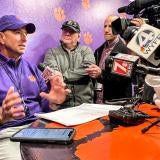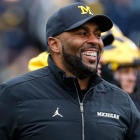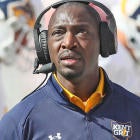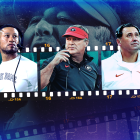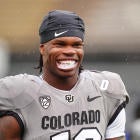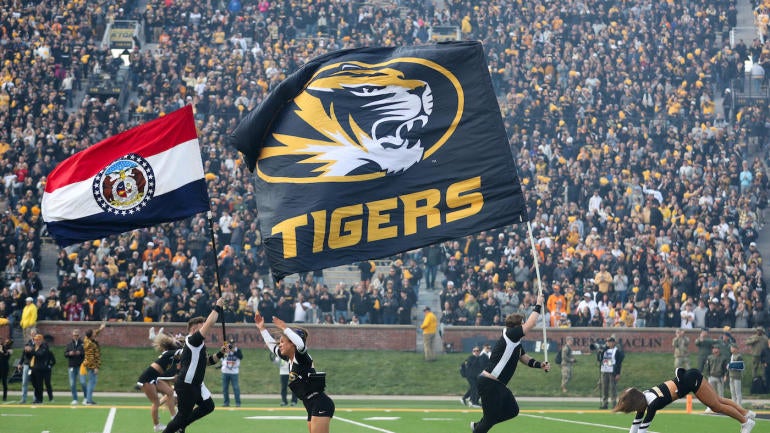
COLUMBIA, Mo. -- Williams Nwaneri is incredibly laid back for a young man about to hit it big. As the highest-profile benefactor of the nation's highest-profile name, image and likeness law, the five-star senior edge rusher from Lee's Summit North knows exactly what's next.
"Prom is May 4, so this weekend," Nwaneri told CBS Sports.
That's not only a refreshing perspective of an 18-year-old high school senior but also a glimpse into a ground-breaking future. Nwareni can expect an NIL payout any day now. Not that he is going to break the bank, though one valuation of his NIL worth comes in at approximately $250,000. No, the most eye-opening aspect is that he'll still be in high school.
In August 2023, Missouri passed a first-of-its-kind law allowing high schoolers to earn NIL benefits once they've signed with a school. The law applies only to Missouri residents. But in a state that typically produces only single-digit blue-chippers in any given year (Texas had 57 four-stars or better in the Class of 2024), keeping the best at home can make a program.
"We're leading the country in this space," Missouri Rep. Kurtis Gregory (R), who helped write the law, told reporters when it was signed.
Now, it's a case of carrying that statement through on the field.
These are heady times for Missouri. The program won 11 games last season for the first time since 2014 and defeated Ohio State in the Cotton Bowl. Had the expanded College Football Playoff field been in place, the Tigers would have met Oregon in a first-round game based on last year's final CFP Rankings.
"For me, it's a chance to create a competitive advantage," said Missouri's Eli Drinkwitz, the 2023 SEC Coach of the Year. "You can either embrace it or hate it. I'm going to choose to embrace it and try to create the best advantage that I can for my football team."
The law came at a time to goose that momentum. Politicians in the unabashed red state of Missouri had been considering ways to ride the NIL wave for a while. Long ago, the courts ruled it an antitrust violation to cap college athletes' ability to earn compensation for their name, image and likeness. Last week, consulting firm Husch Blackwell concluded, "there is little to no deference to any concept of NCAA amateurism."
Missouri legislature took it a step further by essentially creating NIL as an inducement for high school athletes to stay in-state. In football, that means a high school athlete could go six-to-10 months earning money for themselves before hitting the college practice field where they actually have to earn playing time.
The message: Come to Mizzou, get paid early.
"Missouri has the best NIL setup of any state, any school in the country. Guaranteed," said Blake Lawrence, founder and CEO of NIL technology company Opendorse. "One school that's not waiting for the future is Missouri."
The law even shields the NCAA from investigating signees for their NIL benefits. School officials can help arrange those deals.
"Everything about recruiting is an inducement," countered Gregory, a former Tigers offensive lineman. "Telling a kid we're going to have a nice, new locker room next year, or a new weight room. How is that not an inducement to get a kid to commit?"
Nwaneri becomes that distinctive NIL experiment because the question ultimately has to be asked: Would an athlete who is arguably the best high school prospect in Missouri program history have signed elsewhere had the state law not been place?
The 6-foot-6, 260-pound Nwaneri, the No. 6 overall prospect in the 2024 class according to 247Sports, picked the Tigers over Tennessee, Oregon, Oklahoma and Georgia.
"I was going to get a good NIL [deal] regardless of where I went," Nwaneri said. "It definitely was a positive. It was never like the main thing. I wanted to go to somewhere where I was comfortable, felt like my family was comfortable and somewhere I could see myself being successful."
Gregory was asked the same question. If the prospect would have signed with Tennessee or Oklahoma, Nwareni would have had to wait at least eight months to receive NIL benefits. But in signing with Missouri, he'll show up on campus May 26 having already been eligible for NIL benefits for the past five months. Perhaps some of the money already in his pocket.
Athletes are not compelled to reveal their NIL deals.
"It's a great question," Gregory said. "One would like to think that winning and everything else that you absolutely still stand a chance. For me, the fact we clearly laid out in the in-state statute what could happen [matters]. Before there was this law there weren't some coaches talking to them about what could be done NIL-wise?"
Missouri's primary NIL dealmaker for athletes is Every True Tiger, a non-profit facilitator that gets its funding from donors, corporate donations and subscriptions. (Members can pledge monthly amounts.) CEO Nick Garner is a respected former executive at Learfield, where he was once general manager of Mizzou Sports Properties.
"The important piece is that state law has allowed state of Missouri high school athletes the opportunity to unlock these opportunities early. It is a recruiting tool," Garner said. "I'm sure in a case like [Nwareni's], that's great. Maybe it helped put him over the edge. The story is, does it flip the script or not?"
The question of whether Mizzou joins the elites of college football as a result of the advantage may take six years to answer. Or it may take six weeks. The math may have changed, however, as sources told CBS Sports a revenue-sharing deal with players was possible in the near future.
As it stands, the list of states with similar NIL laws to Missouri is growing almost daily. Mizzou's advantage could soon be a footnote as states line up basically to copy law. The race between legislatures and recruiting has become a competition. A giant hole has been left in the system as the NCAA never acted quickly enough and was basically forced to open the NIL gates in July 2021.
Congress doesn't seem anywhere close to granting an antitrust exemption so that the NCAA can apply its rules.
"I would definitely say so [it has become a competition] in a roundabout way …," Gregory said. "Do you honestly think a senator from Alabama -- say Alabama has a better [NIL] law than LSU -- is going to vote for parity for LSU to have the same thing?
"We don't want the feds to come in and screw up the fun."
Among the first remarks during his introductory press conference Friday, new Missouri athletic director Laird Veatch praised the administration for its "progressive approach" to NIL.
"You're going to have to be aggressive and not think like everybody's been thinking for the last how many years," Veatch said.
Missouri fans have thought one way for years while crying out for the program to lock down the best in-state players. That wasn't unlike other states except, again, Missouri doesn't tout too many elite prospects. The top players from the state usually went to bigger, better programs.
But there is historical evidence Missouri can win from within. In 2007, Gregory was one of 10 in-state starters on offense. Only quarterback Chase Daniel (Texas) hailed from out of state. Missouri went 12-2 that year and was ranked No. 1 for a week.
Hall of Fame coach Gary Pinkel led that 2007 Tigers team.
"You've got to get in the game," he said. "You have to have money. There is no way around that. Where it's going to go someday, I don't know. I used to hear the words 'student-athlete' and 'graduation rates.' I don't hear anything about any of those things anymore.
"My biggest problem with the whole thing is I don't want the coach who has the most money [to win] when this guy is a better coach and has a better team … but they just don't have the money to compete at this level. I think that's unfair."
What's fair about any of this except the players getting their cut?
Missouri's venture into the NIL space has been tasteful. Schnucks, a leading supermarket chain, has brokered deals with numerous Missouri athletes. When five-star wide receiver Luther Burden came to Missouri (prior to the law), his advisor Demetrious Johnson told CBS Sports he wanted to keep Burden's head on straight.
Instead of getting a used luxury car from Mercedes-Benz of Columbia, Burden was compelled to drive a used Impala as an NIL benefit once he arrived on campus.
"They were willing to give him a very nice car, a Mercedes-Benz. I told him we were not going to do that," Johnson told CBS Sports. "We want to keep him very, very nice and humble."
In this NIL era, humble is a relative term. Tennessee redshirt freshman quarterback Nico Iamaleava reportedly signed an $8 million NIL deal full of bonus clauses -- an NIL outlier in a conference (SEC) that isn't going to be left behind.
"I feel like [the law] was long overdue," Nwareni said. "I also feel like they're going to put some kind of limit or cap [on it]. Right now, I feel like it's a great thing for the sport and for athletes like myself around the country."
Yeah, but are you good for prom, Mr. NIL? Tux? Ride? Nosegay?
"Stuff like that, it makes even more easy [to afford]," Nwaneri said.







